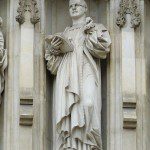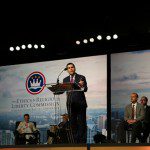In January 2016, Bush made a statement on same-sex marriage that seemed to be a model for traditionalists seeking to faithfully navigate a new legal and cultural reality.
In hiring Jordan Sekulow, son of prominent Christian conservative legal advocate Jay Sekulow, Bush sought to connect his campaign to various elements of the Christian conservative political movement.
In May 2015, Bush gave a well-received commencement speech at Liberty University in which he forcefully defended religious liberty.
But when WORLD Magazine began an unscientific monthly poll of evangelical insiders, Bush underperformed. A plurality of elites preferred Florida’s junior senator Marco Rubio, a Roman Catholic. Most of the rest supported Southern Baptist Texas Senator and 2013 government shutdown architect Ted Cruz.
Rubio’s campaign profited from several viral YouTube videos in which the young senator articulated a generic “mere Christianity” that sounded more Baptist than Catholic as he campaigned across Iowa.
Cruz stuck to the old religious right script, speaking of the need to revive a Christian nation before God abandons it to the flames.
Last August, Bush did a Q & A at an evangelical conference with the Reverend Dr. Russell Moore, the Southern Baptist Convention’s top public-policy official.
But in spite of Jeb’s “correct” positions, Moore’s circle was already gravitating toward the less-experienced but presumably more electable Rubio.
When Pope Francis visited the United States in September, Jeb wrote an op-ed for CNN about how Catholic faith changed his life.
Failing with the new Christian right, Bush’s faith adviser arranged an October event in Virginia Beach with religious broadcaster Pat Robertson.
But the leaders and activists from Christian conservatism’s old guard were by then largely in Cruz’s corner.
Having failed to attract leaders from any element of Christian conservatism, Bush retained the support of donors and the country-club set, but never won much enthusiasm among base voters.
The mystery in all this is that Bush’s positions and experience were well aligned with religious elites’ preferences. Somehow Jeb Bush, who once asked that someone legally represent the interests of a mentally disabled rape victim’s unborn child and intervened prominently in the Terri Schiavo case, was not pro-life enough for today’s conservative Christians.
It’s not that conservative Christian leaders had anything negative to say about Bush. He simply was never their first choice. Now that they can demand almost every candidate conform to their policy preferences, electability is their primary concern.
It makes little difference whether a successful two-term governor or an inexperienced rookie senator gets to, as president, appoint judges who oppose legal abortion. What matters to social conservatives is that a pro-life candidate wins the White House.
In the end, Rubio’s perceived electability trumped his thin resume in conservative Christian leaders’ political calculations.
White conservative Christians are still, of course, white conservatives. Bush’s nuanced positions on education policy and immigration reform clashed with the views of GOP primary voters. They were liabilities that his social-conservative record could not overcome.
When Donald Trump turned the GOP’s already nativist tone on immigration into blatant racist nationalism, Bush more than anyone else spoke compassionately about immigrants.
Jeb Bush departed the race as he entered it: a pro-life Catholic who is strong on traditional marriage and religious liberty yet ironically has little appeal to social conservatives.
Whereas Jeb’s elder brother was seen as perhaps the perfect politician to unite economic and religious conservatives, today almost all Republican candidates pledge to do the bidding of both.
For all his desirable positions and campaign cash, this son and brother of former presidents could not convince the base that he is a winner.












